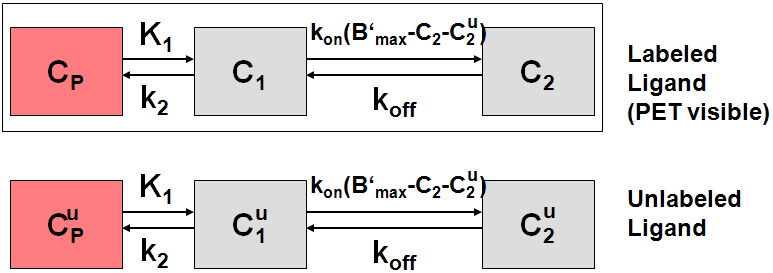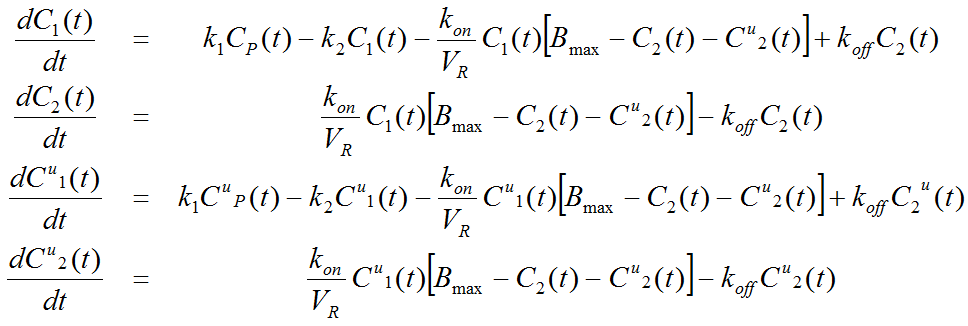This model corresponds to a triple-injection protocol developed by Delforge et al. [1] for [11C]flumazenil PET. The setup includes three injections of labeled and/or unlabeled ligand during a single acquisition. The model is based on a 2-tissue compartment structure and accounts for the saturation of the benzodiazepine receptor. The uptake and binding of both labeled and unlabeled ligand is modeled by two parallel compartment models linked by common model parameters.

Differential Equation of the Mass Balance
They are linked by common model parameters and the system of differential equations

Note that only the labeled ligand can be measured, both in PET and in the blood samples. Therefore the input curve of unlabeled ligand Cup(t) must be derived from the input curves of labeled ligand Cp(t). This task is complicated by the fact of metabolite build-up in plasma which must be corrected for. With T1, T2 and T3 denoting the time of the three injections, the input curve Cp(t) of hot (labeled) tracer is calculated from the total plasma activity Cplasma(t) as follows:

This metabolite correction is implemented as the input curve model Multiinjection, HOT.
The input curve Cup(t) of cold (unlabeled) tracer is derived from Cp(t) by the expression

which is implemented as the input curve model Multiinjection, COLD.
Operational Model Curve
Since PET only measures the radioactively labeled compounds the operational equation is given by

with the concentration CB(t) of labeled compounds in whole blood, and the blood volume fraction vB.
Parameter Fitting
The model includes six parameters vB, K1, k2, Kon/VR, koff, Bmax which are normally not possible to fit at once. However, the complex injection protocol results in more complex tissue TACs than with the usual single-injection protocols. As a consequence, the model has proven to result in reliable estimates of Bmax.
Reference
1.Delforge J, Pappata S, Millet P, Samson Y, Bendriem B, Jobert A, Crouzel C, Syrota A: Quantification of benzodiazepine receptors in human brain using PET, [11C]flumazenil, and a single-experiment protocol. J Cereb Blood Flow Metab 1995, 15(2):284-300. DOI
Acknowledgement
The model implementation was supported in helpful discussions by Dr. Philippe Millet, University Hospital Geneva, Switzerland.